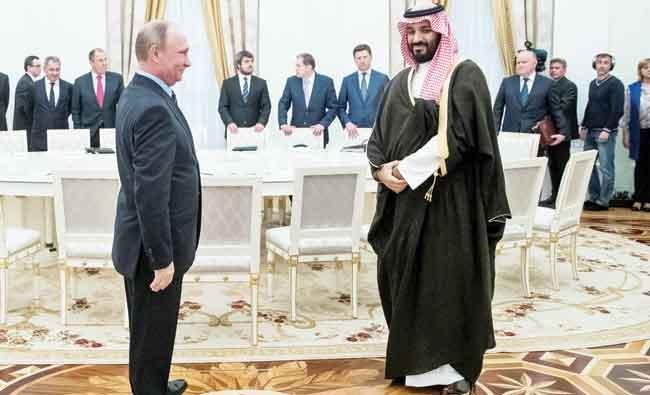
Energy main binding factor for Saudi Arabia and Russia
Saudi Deputy Crown Prince Mohammed bin Salman arrived in Moscow on Tuesday to meet President Vladimir Putin.
His visit comes one week after the historic summit in Riyadh, which was followed with relative anxiety in political and diplomatic circles in Moscow.
US-Russian ties continue to be strained, so Washington’s movements in the strategically important Middle East made Russia keep a close eye on what happened in Riyadh.
Russia is seeking to extend its presence in the region. Despite its close ties with regional pariah Iran, Moscow is interested in building bridges with the Arab Gulf states, even though there are significant disagreements on many international issues. The deputy crown prince’s visit to Moscow balances the Riyadh Summit, demonstrating that the Kingdom is ready to maintain fair and open dialogue with all countries that are eager to do so.
The main topics of discussion were stabilizing the world oil market and Syria.
Putin’s and the deputy crown prince’s estimations of bilateral ties are similar and quite positive. Putin has noted that the two countries work together to settle complex situations, including Syria. But energy is the main binding factor as both countries depend economically on oil market stability and high oil prices.
Bilateral cooperation facilitates stabilizing the global oil market. The deputy crown prince has noted that bilateral ties are experiencing one of their best stages of development as there are many points of mutual understanding and clear mechanisms to overcome disagreements. Politically there are no severe disputes between the two countries, which permits them to develop bilateral ties positively and constructively.
There are 25 mutually beneficial investment projects totalling $10 billion that are under examination. This is tiny compared to the volume and number of those reached between the Kingdom and the US, but the Saudi-Russian projects would be a true breakthrough if approved and signed.
Experts are unanimous that the visit will have a positive impact on bilateral ties.
Nickolay Soukhov, senior researcher at the Institute of Oriental Studies at Russia’s Academy of Sciences, said: “The fact that the Saudi deputy crown prince arrived in Moscow one week after the historic summit in Riyadh demonstrates that the Kingdom is eager to keep balance in its foreign policy and to diversify its ties.”
Anton Mardasov, expert at the Russian Council on Foreign Relations and head of the Middle East conflicts department at the Institute of Innovative Development, said: “Moscow is interested in building partnerships with the Gulf monarchies, and with Saudi Arabia in particular. It was noticeable even in contacts within the framework of OPEC (the Organization of the Petroleum Exporting Countries).
“Cooperation between the two countries is also needed on Syria. It’s likely that Deputy Crown Prince Mohammed bin Salman has come to Russia partly to figure out how serious Moscow is about maintaining safe zones in Syria. Russia is interested in cooperating with the Kingdom and the GCC (Gulf Cooperation Council) on Syria’s post-war restoration.”
Currently, just one thing is missing to turn a new page in bilateral ties: A visit by King Salman to Moscow. The Kremlin has awaited such a visit for almost a year and a half. It would be the first visit of a Saudi monarch to Russia in history.
Some Russian politicians are eager to cooperate exclusively with Iran and significantly distrust the Kingdom, but on the whole Moscow is interested in strengthening ties with the mighty power of the Arab and Muslim words. About 20 percent of Russia’s population is Muslim; several of its republics are 90-99 percent Muslim.
Russia regularly faces terrorism and extremism, and so has significant experience in fighting them. Full-scale bilateral cooperation in this field would benefit both countries and the world.
The motor of Russia’s ties with the Arab Gulf states, including Saudi Arabia, remains Chechnya, headed by Ramzan Kadyrov. He has succeeded in bringing his republic’s ties with dominant Muslim powers to the highest level.
Bilateral ties need a positive agenda formed not only within a tight political framework, but via media speaking directly to the public, and via direct and open communication. Hopefully this will be the case when the king finally visits Russia.

























